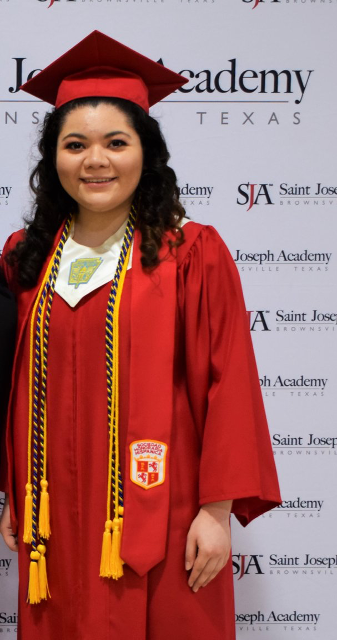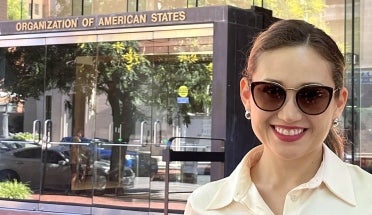
International Student Experiences the Forty Acres from Home in Mexico
- Mar 11, 2021
- International Student and Scholar Services
Just across the U.S.-Mexico border in Matamoros, Mexico, UT freshman Diana Arriaga is engaging with the world through her online classes, learning how to make connections, ask critical questions and explore new ideas.
Arriaga is a freshman majoring in plan II honors as well as international relations and global studies. So far, she has taken all her classes remotely from her home in Matamoros. Taking courses in subjects such as linguistics, Quechua and world literature, Arriaga is increasingly motivated to learn as much as she can with her Longhorn community.
Due to the COVID-19 pandemic, significant complications and delays have affected UT students on campus and around the world, including Arriaga, whose family friends helped her get her textbooks in time for the fall semester.
Despite many unexpected obstacles, Arriaga is making the most of her first year at UT Austin. While at home, she has been learning new skills and spending time with her family. Four hundred miles away from campus, she is leveraging online technology to make new friends, join student organizations, meet mentors and enrich the start of her education at UT Austin.
Arriaga recently shared her story the International Student and Scholar Services Blog. Read about Arriaga’s experience in her own words.
A Tale Between Two Cities
On the morning of what would become my last day of high school in Brownsville, Texas, sheer terror bled through me when my anatomy teacher told us Border Patrol would be closing all three international bridges to the U.S. later that day because of the novel disease circulating the world.
As an international student who crossed the border bridge from Mexico to the U.S. daily to attend school, the alarms in my head went off immediately; I was sure others could hear them, as my best friend looked at me with skepticism. The national border buzzed with uncertainty as many feared the drastic consequences of its shut down, potentially leaving me with no way back home. What am I going to do? Where am I going to stay? Will I see my mom again? How long will this last?
I was born and raised in Mexico, just across the border from Brownsville, Texas. If you know where San Antonio is, go further down, beyond Corpus Christi; when you hit the very southernmost tip, that is Brownsville. If you look across the map’s border, you will see its twin city, Matamoros, Mexico, my forever-home and current virtual college campus. The closest thing I have to any distinctive UT landmark is a burnt-orange sunset every day; my tower is the stars everyone wakes up to. To feel closer to my Longhorn Family, I have even nicknamed my dog “Bevo.”

Even before I started school, I crossed the border habitually with my family: from shopping to dining, Brownsville was ever-present in my life. Beginning in elementary school, I traveled every day to attend school, often rising with the sun to avoid as much bridge traffic as possible, even more so when I practiced with the swim team at six o’clock in the morning. Now, I cross international boundaries virtually, continuing to build a life between two countries.
Being an international student poses troubles of its own, but being an international student amid a pandemic that cut my senior year short and transformed my first year of college into uncharted territory has certainly complicated matters further. From ICE threatening to deport students taking fully online courses to fearing a closed border would separate me from my family indefinitely, my first semester of college has been a rollercoaster since I received my acceptance letter. Despite being immediately close in geography, receiving items shipped to Mexico takes months: a package from the Plan II Office mailed in early June arrived in late September, prompting my mom to rent a P.O. Box in the United States.

However, the crossing restrictions imposed on the bridges have grown in severity since March. I feared I would not be able to cross for my socially-distanced graduation, previously canceled twice. Even with an American address, I have had to rely on family friends to bring me my schoolbooks after they had arrived. U.S. embassies and consulates have remained closed since the beginning of the pandemic, further complicating the issue of attending in-person classes and filing the necessary paperwork, like renewing my visa and SEVIS record. The physical limitations of COVID-19 are frustrating enough, but legal matters exacerbate that feeling.
I am lucky enough to be in the same time zone as Austin, unlike many of my peers around the world currently taking classes late into the night, struggling to adapt to a new schedule the COVID-19 pandemic has forced upon them. I opted to take courses from home for the duration of the fall semester. Though I could not wait to attend campus and explore the city with new friends, I knew I would not feel safe, no matter how many precautions I took. The University has put many safety measures into place, but I am not the only one who still worries that any careless individual could ignite a massive outbreak.
I am currently pursuing two majors: Plan II Honors and International Relations and Global Studies. I applied to Plan II to combine humanities, sciences and social sciences across my educational career at the university. I am confident that an academic career aimed at understanding worldwide problems, combined with the invigorating nature of the Plan II program, will help me convert my passions into skills that I can use to change the world. My inquisitive spirit pushes me to constantly seek answers to questions and to appreciate learning for the sake of it. I have compiled a list of words that cannot be translated from their original language but are nonetheless understandable because of how deeply they resonate with me, a quirk that inspired me to take both a Linguistics and Indigenous Latin American language course this semester.
Every day I wake up and go to online class with coffee in hand, a constant variable in my ever-changing class discussions. Each of my classes covers different subjects, but I have made connections between all of them. For example, my linguistics course has allowed me to dissect language further using questions of why and how. Phonetics was an especially fun lecture since we were sounding out English pronunciation: if you have ever seen Finding Nemo, you will know exactly what I mean when I say we resembled Dory speaking Whale, the teacher included.
Additionally, learning Quechua has given me a glimpse into the historic culture of the Andes region and a tool to create awareness of the tongue’s endangered status, inspiring others to learn and treasure it. Though the language class only has five students and I am the only freshman enrolled, I am not intimidated because I am motivated to learn as much as I can.
I also joined various student organizations that foster my interests and share my ideals of building community through friendship, including First-year Leaders in Progress (FLiP), Students Fighting Climate Change, the Refugee Student Mentor Program, Students Making an Impact through Love and Empathy (SMILE), Gen UN, Plan 2 Student Association Social Committee and Texas Brain Exercise Initiative (BEI). In all these groups, I have found mentors to help me grow as an individual during my time at UT.

Though I was not the only student from my high school who chose to attend UT, I am the only one who is studying from home. Reaching out to other students online has been somewhat daunting: even if the other person has their camera on, there is an invisible barrier of “stranger-ness” that is eventually broken down during social media interactions and casual game nights. Everyone is open to making friends, it just takes a little more effort at Zoom University.
I chose UT because it offered me the opportunity to forge my path through Plan II, combining my passion for the humanities as well as my interest in social sciences. The University promised to help me develop as an individual, more so during times of COVID-19, and its global community demonstrates the many doors that can open for me in the future anywhere in the world.
This year is not what I expected, but I have learned to appreciate the opportunities that have revealed themselves to me. I am learning new skills, like cooking, braiding and embroidering. I am spending more time with my family as a tech guru and a storyteller, recounting what I learned in class. I am forging new relationships while staying in touch with old friends. The fact that change is constant comforts me; soon there will be new challenges to face, but I will confront them with experience in my pocket because anything that comes after the pandemic will be minor in comparison.



